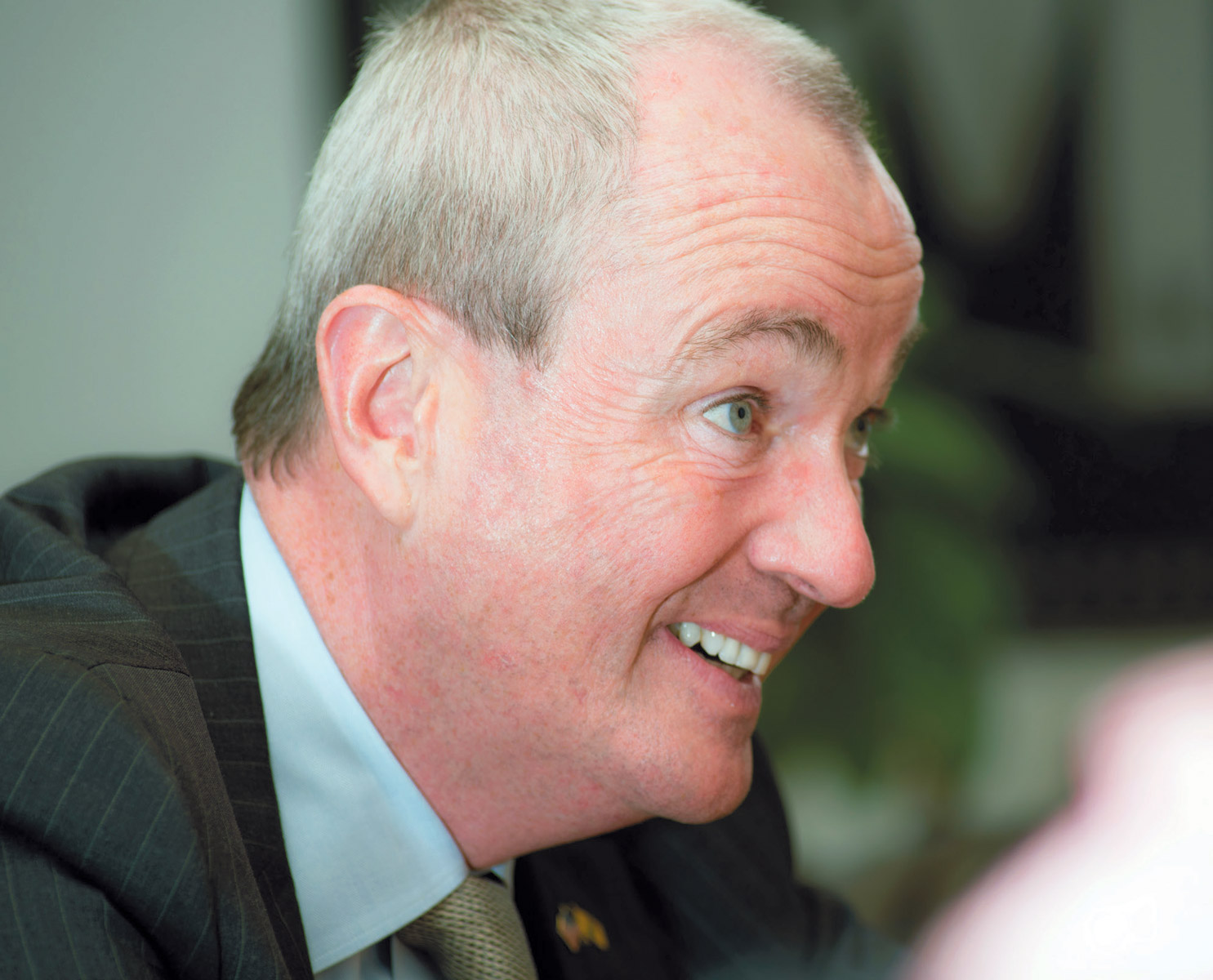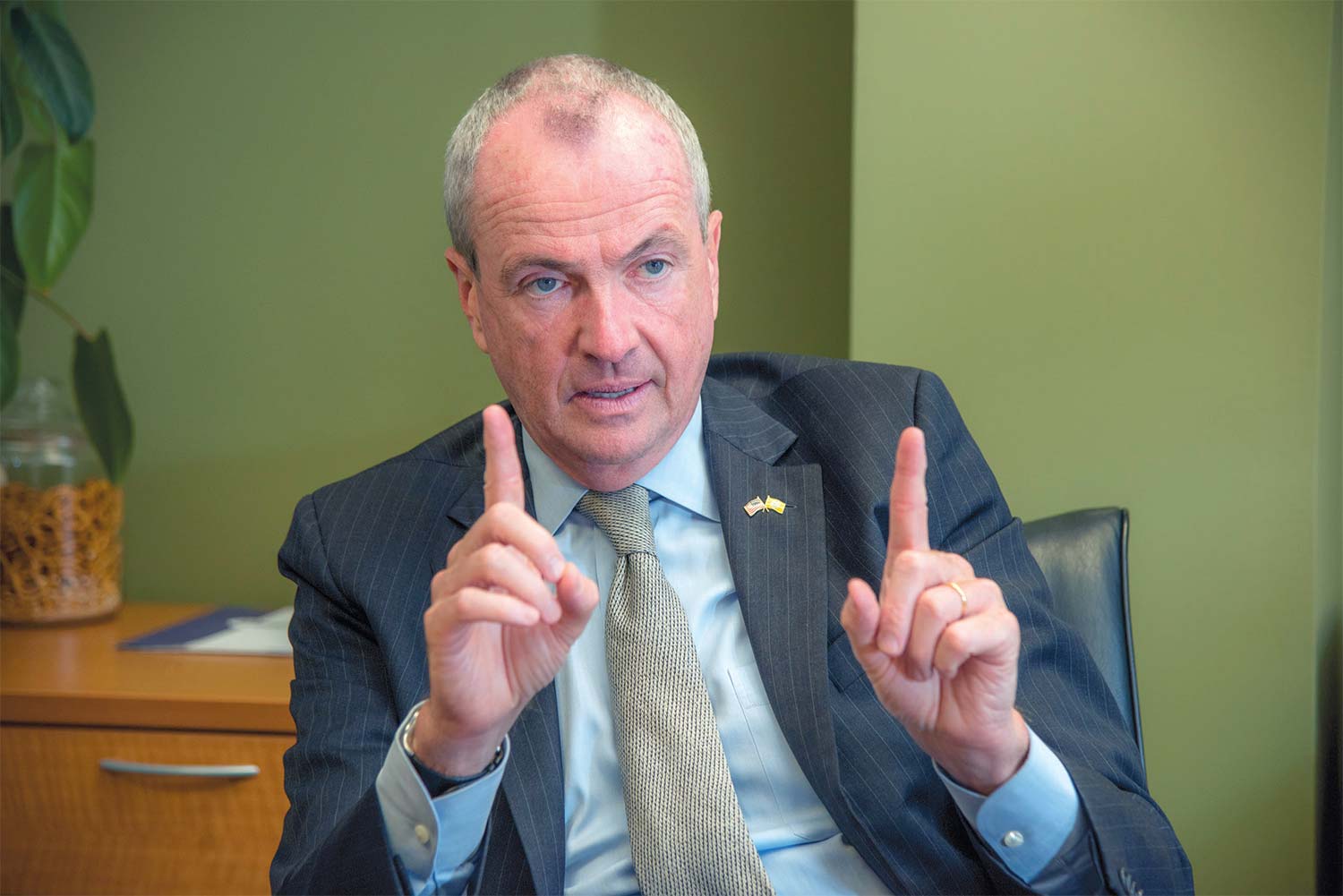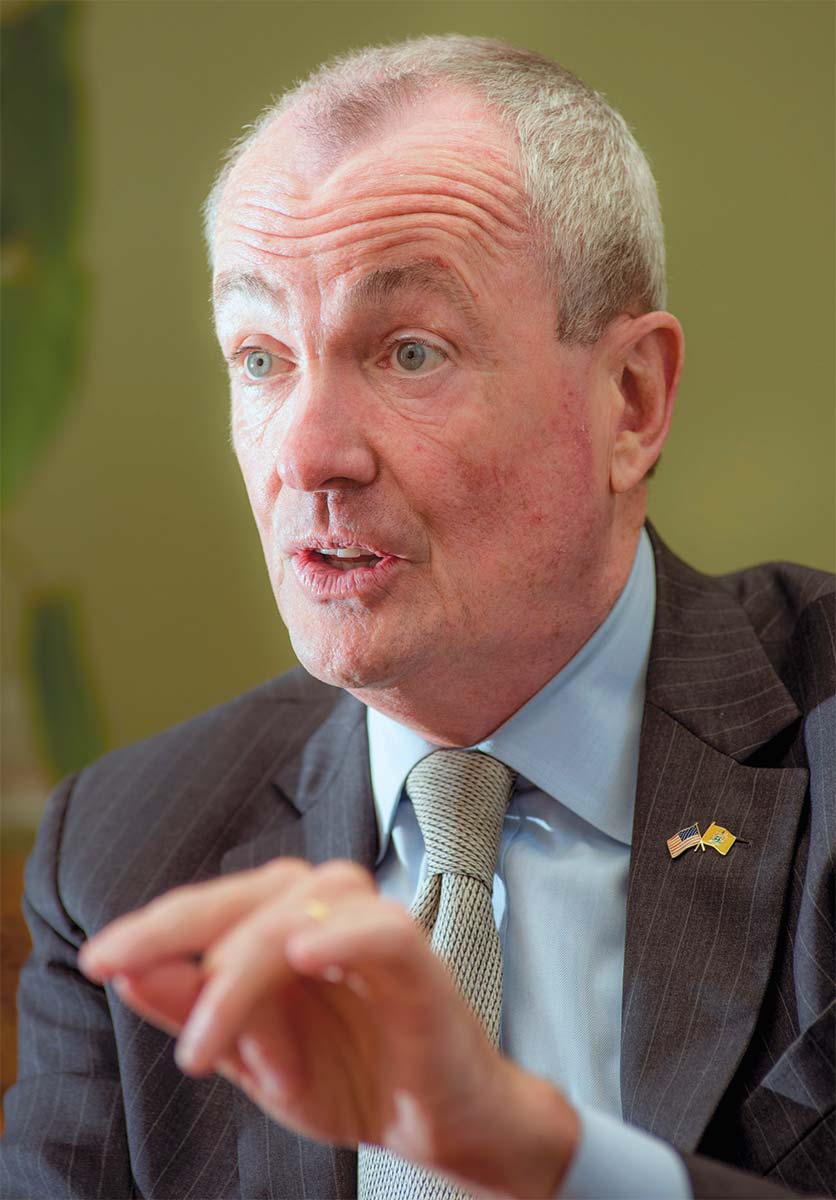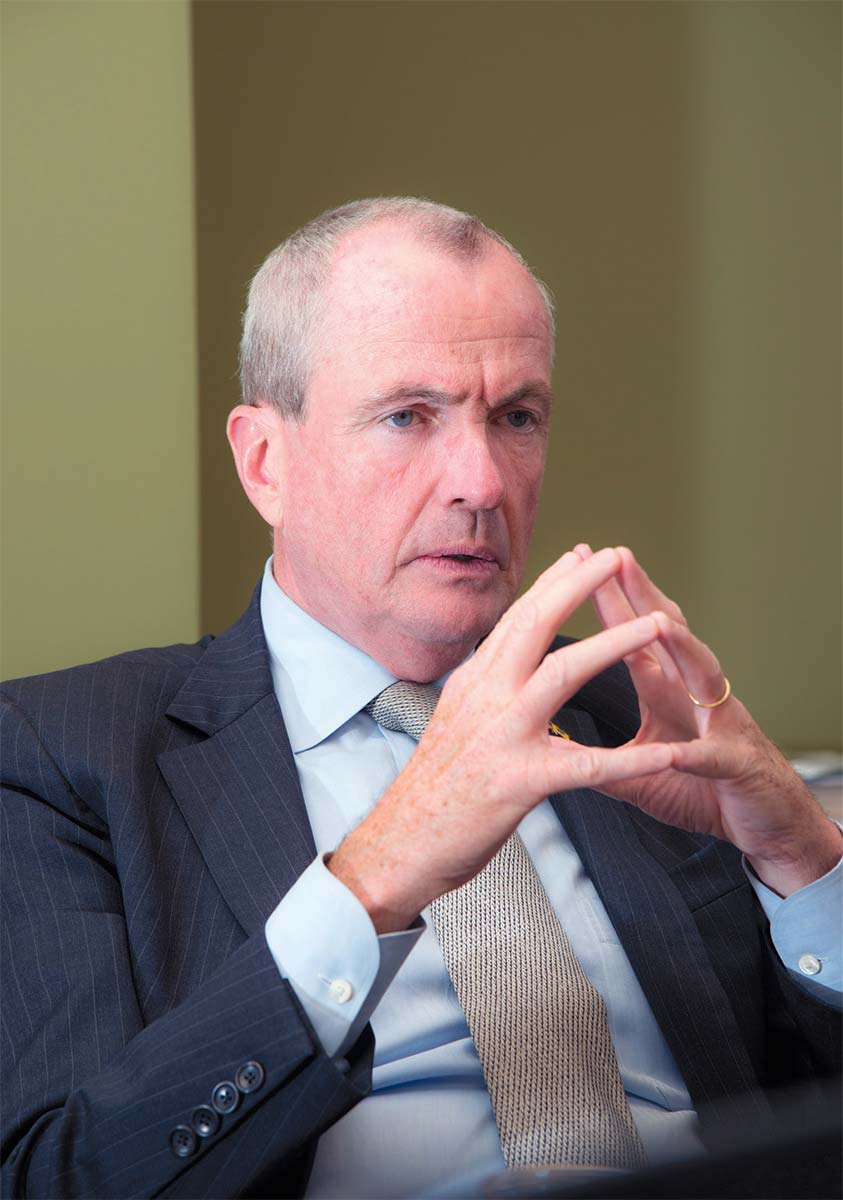Phil Murphy Talks Environment, Sustainability and Health
Talks Environment, Sustainability and Health
Regardless of one’s political leanings, a focus on environmental and sustainability issues unites Edible Jersey readers. We share those values, which is why we celebrate the state’s innovators, from the mom-and-pop restaurant to the organic farm. Yet keeping a vision-driven enterprise afloat in New Jersey is tough, and the intersection of doing well and doing good can be hard to find.
The gubernatorial election is fast approaching. It is pivotal that our next governor support entrepreneurship, advance environmental objectives and push us toward our potential as a sustainability-minded state. Democratic candidate Phil Murphy has made environmental issues a cornerstone of his campaign; we wanted to know more. As we discovered in an exclusive interview with the candidate, Murphy believes that we can reactivate New Jersey’s national leadership potential regarding sustainability and climate change by embracing our unique assets and advantages.
“We’ve been dealt a hand, and we have not played that hand well. Nine million residents. Top three public schools in the nation. Among the greatest institutions of higher education in the nation. A location—whether it’s our proximity to the shore, or our proximity to New York or Philadelphia, or [our location] on the Northeast corridor—that [most] states would die to swap in for. We’re the most diverse state in the nation. We are the Garden State at the same time. That’s hard to pull that off, but we have, right?
“Yet we have not played up to our potential. We have not maximized that hand . . . and that’s due to leadership, beginning with the government. We have to get back to punching at our weight.”
In his view, this includes advancing policy recommendations that have implications for both entrepreneurs and the environment, including:
- A public bank intended to keep money in New Jersey
- 100% clean-energy New Jersey by 2050, including investments in solar and offshore wind
- Healthcare as a right, not a privilege
- Tax incentives for Jersey entrepreneurs
A recap of our conversation follows below, but, lest we get too serious, we also got the scoop on Murphy’s culinary favorites.
“Please don’t hold this against me. I love liver. I grew up eating beef tongue with my dad’s sandwiches.” He’s also a fan of broccoli and a proponent of Jersey wines. You heard it here first.
“The closer the environmental and
agricultural interests work together,
the better it is for all of us.”
ENVIRONMENT
You have a vision of New Jersey as a hub for climate-change research. Can you elaborate?
“We have put forward a vision for a 100% clean energy New Jersey by the year 2050. If you look at interim benchmarks, one of the things we pointed to is an offshore wind target of 3,500 megawatts by the year 2030. That would make us the number-one offshore wind location in the country, and potentially vying with the Germans in the world. If you actually set those targets, you by definition attract the research. You attract the manufacturing. You have the real potential to dictate the terms on where the wind research takes place, where they build the turbines, where they do all of the backing and filling—because it’s you.
“Look at what Rutgers already does in the ag world. I was at Stockton University’s new campus that is being built in Atlantic City: that has real potential on ocean and marine research. There’s lots of opportunity, and I think Princeton [University] has enormous potential still to be unlocked. I just don’t think we’ve played our cards right.
“Within 20 minutes of [President Trump] backing out of the Paris Climate Accords, we said we will, if we’re elected, sign up to those level of accords, just like other US states are doing. We will adhere to those standards. New York and Washington State were the first two that said that. We were right behind them. We’re as far from the President on that stuff as we can be.”
What are other aspects of climate-change policy that have to be prioritized?
“Give as much credit in the rate base for saving 300 megawatts through conservation as you would get if you had built a 300-megawatt fossil-fuel plant. [Former Vice President and environmentalist Al] Gore is one of our principal advisors. . . . His people contribute a lot to our environmental policies. The notion that the asthma rate of kids in Newark is four times the state’s average, largely because you are sitting next to the port, and all of the trucks that emit are coming in and out. When people hear about the environment, they rightfully think about big open spaces and water and all of that, and they should. But we also have to put policies in place for an urban environmental justice agenda.”
What about rising seas?
“There are things we could be doing that we are not doing. I’m talking about recovering from Sandy, never mind what we should be doing to prevent another one. Beyond the dune replenishing actions, and building homes to a different set of standards, particularly in terms of elevation—both of which seem to me are smart things to do, although the dune piece is a controversial one depending where you sit on that—we mostly talk about mitigation in the global sense. The sobering part of this is that New Jersey can get an A+, finish first in our class, and we could still have a world that melts, notwithstanding everything we do.
“Hoboken got crushed in Sandy, and [Mayor] Dawn Zimmer did something that we admire, which is [to say] ‘where in the world can I find a place that has the same issue, and what have they done about it?’ And guess what? She ended up going to the Netherlands, a country that lives under sea level. She said, ‘they’re still there, what do they do?’ The whole storm remediation infrastructure that they’ve got out in their waters, she’s got that as a project that we ought to be funding.”
As to recovering from Hurricane Sandy, Murphy has promised to fight for federal funds, increase transparency and make decisions on disaster relief based on the public interest, not partisan politics. We followed up.
Does that mean hope for those who are still unable, five years later, to return to their homes? Or for those who received Sandy aid and were forced to pay it back?
Derek Roseman, Murphy’s communications director, says yes. “Phil supports both legislation that would help Sandy victims get back aid that was taken away and improving the RREM (Rehabilitation, Reconstruction, Elevation and Mitigation) program so those families who are still out of their homes can get back in.”
An estimated 40% of our food is wasted in the United States. New York has implemented an organic food-waste recycling program. Are these issues on your agenda?
“We looked at what New York is doing and we like it. [It’s a topic] we haven’t really gotten to yet, but that’s something that we’ll look at and that we like.”
ENTREPRENEURSHIP
Central to Murphy’s candidacy is a proposal that New Jersey launch a public bank, the second in the country after North Dakota. With three lines of lending—student loans, small-scale infrastructure and small business—Murphy says the aim is to get money more efficiently and in greater scale to start-ups and entrepreneurs.
Should government as an entity be nurturing business innovation in the state? If so, how?
“Should government play a role? The answer is yes. Let’s form a bank in New Jersey, owned by the people, that has the exact mirror charter [as a community bank]: that all of the money stays in New Jersey and gets put to work in New Jersey. This is one example of how government can play an activist role. The people who are opposed to it? Big bankers. That gives me more conviction that it’s a good idea.”
Agriculture and food form New Jersey’s third-largest industry, with more than $1 billion in cash receipts in 2015. Yet barriers to entry are high. How do we ensure the sector’s viability?
“The closer the environmental and agricultural interests work together, the better it is for all of us. So, preservation, conservation only goes in the right direction. Higher education matters. Industries follow where the really smart research is being done, and I know Rutgers in particular gets a gold star. The more that can be promoted and invested in, the better. Thirdly, it’s not ever going to be cheap to get land in this state. So that probably leads you to a couple of conclusions. One is that it’s probably more niche farming than it is big-scale, just because of the ticket price involved. Secondly, the public bank is one idea, but finding better, more efficient ways to get capital into the hands of the folks who need it [is important].
“We’ve been quite critical of the way [the current administration] has used tax incentives. That’s not to say that we don’t think tax incentives make sense. My criticism is that the way they’ve done them, they’re a blunt instrument. That’s the only thing they ever use—and typically it’s with big companies. I want big companies as much as the next guy, but there’s more to it than that. Small- and medium-sized businesses employ and will be the biggest incremental increase in this state, not the big companies. What more can be done with incentives that would acknowledge the high cost of land, that would acknowledge the pressure to develop? Maybe incenting for a particular size farm, incenting for employing New Jersey folks.
“We’re hoping that if we get there we’ll be able to have another cash crop, and that’s marijuana. If it becomes a reality, it’s going to be in the broad farm discussion. We’re big believers in legalization of cannabis. The last reason to do that is money. Public safety, criminal justice, social justice is a big piece of this. We have the widest white/non-white gap of persons incarcerated in the country—and if you cut through it all, the largest reason, though not the only reason, is low-end drug crime.”
Many entrepreneurs lose out to Walgreens or Starbucks, who have a corporate philosophy and are able to streamline. That’s difficult for a mom-and-pop organization to do, and we as a state, as a culture, lose out.
“In Asbury Park, one of the things that screams out at you is the mom-and-pop food, wine, craft beer. When you see those entities thriving in a community, you can almost put it in the bank that something has happened there. You walk up and down Ferry Street [in Newark] and see small business owners. The challenge for communities like that is they have to make sure it’s worthwhile for those who fought and stayed. This notion has big urban applicability as well. Newark celebrates rightfully that Whole Foods [has opened there]. Should farmers’ markets descend on Newark and big urban environments, where you have freshness and good value for the money at the same time? That’s pretty compelling.”
A lot of young chefs are leaving New York for Brooklyn, because you can open a restaurant and spend $3,000 to $6,000 for a liquor license. Could a reduced-rate liquor license revitalize our cities?
“The notion of the urban enterprise zone is a version of that. Put chum in the water to attract businesses to locate there and for consumers to come in and shop there and eat there. Those notions are good ones.”
HEALTH
Murphy sees imperfections in the Affordable Care Act, while also citing it as a “game changer” in terms of promoting healthcare access among a broader range of citizens. He says he wants to make it better, and to “defend, defend, defend at all costs.” As he puts it: “I’m of an opinion as a general matter, and healthcare is as good an example as any, that governors will have never mattered more than right now in this environment.”
Your position is that access to healthcare is a human right. How do we right the system so that both businesses and residents can afford to be well?
“I strongly view healthcare as a right, not a privilege. The Affordable Care Act made a big difference. It is wildly imperfect, but it made a huge difference. There are about 800,000 more people [in New Jersey] who have healthcare, who didn’t have it before. Three-point-something million with pre-existing conditions. Tens of thousands of kids who are on their parents plans until 26 who wouldn’t have been. Access to vitally important drugs for seniors. Fifteen- or twenty-thousand people who are employed now who wouldn’t have been in healthcare, because of the Affordable Care Act. Access to healthcare for women.”
“If the Republican House healthcare bill went through, objectively, New Jersey is victim state number one. If their tax plan went through—which looks to me like it was written on the back of a cocktail napkin—New Jersey is victim state number one. It’s a complete fiscal and healthcare disaster in our state, and then I say everything’s going to be on the table: Medicare for all, I wish at the federal level. You never know with Trump. That’s expensive, but it would cover everybody. California has priced out a single-payer system, and California is bigger than we are, four times as many people at least: $400 billion dollars. In our state, it’s about a $40-billion-dollar price tag over 10 years, but you have to look at everything.”
With obesity, we’ve engineered a lot of our own problems, such as high-fructose corn syrup. A few steps in the other direction could go a long way, a soda tax being one idea.
“I like the other side of that equation as well. I want to unleash the farmers’ market in Newark. I want to unleash the farmers’ market in Trenton and Camden and Paterson. I served President Obama as US Ambassador to Germany. I’m a big fan of his, and of the First Lady’s. I love what she was doing, being a positive role model in terms of a healthy life. I’m a big believer, whether it’s healthy lives, whether it’s criminal justice, you name it, let’s do the work up front to show folks a better way. That may be a big mountain to climb. That may be a lot of work. But boy, will it save us a lot on the back end.”
A related issue is the opioid crisis, with a tally of 5,000 overdoses in New Jersey over the last decade. Can you talk to the longterm economic benefit of easing barriers to care?
“Get out ahead of it now, and you’ll reap the benefits, certainly for the victims, but for society more generally. We live in Monmouth County. It’s a raging crisis. I was in Ocean all day yesterday. It’s worse there. Anything we can do to get out ahead of that, the better. Listen, I’m a big critic of Governor Christie’s, but I appreciate that he’s been standing up and talking about this. It’s late, but it’s better than not. He’s now talking about, for instance, that first prescription—to limit it to five days. We had talked about seven days.
“I’ll give you a story that should scare the heck out of us. Our son was in a bad automobile accident two years ago. He’s fine, but he shattered his collarbone badly in a whole bunch of different places. He had a surgery relatively immediately, and the surgeon gave him a prescription of Percocet: 92 tablets, and if I’m wrong, I’m off by like four. He had a total of four, and we handed the rest of them back.
“You sit at a place like Integrity House in Newark, and you go around the table and people tell their stories about how it all started. Invariably, it’s prescription. The one area on the Governor that I am critical of is you can’t be all in and out there like he is—as he should be—on the opioid piece, and be silent when Medicaid is being dismantled before our eyes. Those do not compute. Most of the victims here are reliant on Medicaid over there to get the treatment they need.”
Editor’s Note: Edible Jersey reached out to Phil Murphy because of our shared commitment to environmental and sustainability issues. Murphy’s opponent, Lt. Gov. Kim Guadagno, also has promised to rejoin the Regional Greenhouse Gas Initiative. We requested an interview to further discuss her positions. Check ediblejersey.com for updates.
VOTE
The New Jersey gubernatorial election takes place on November 7, 2017. To find your polling place and check your registration, visit elections.nj.gov.










